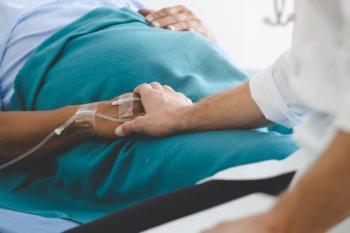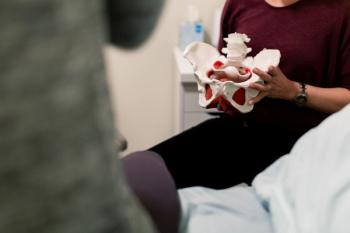
Alison Edelman, MD, MPH, dives into her research presented at the 2024 ACOG Annual Clinical and Scientific Meeting on COVID-19 vaccination and it's impact on the menstrual cycle.

Alison Edelman, MD, MPH, dives into her research presented at the 2024 ACOG Annual Clinical and Scientific Meeting on COVID-19 vaccination and it's impact on the menstrual cycle.

In this video interview, Jamila Perritt, MD, discusses her presentation at the 2024 ACOG Annual Clinical and Scientific Meeting on how ob-gyns can be an effective advocate.

A new study presented at the 2024 ACOG Annual Clinical and Scientific Meeting highlighted significant gaps in polycystic ovary syndrome (PCOS) care, revealing widespread patient dissatisfaction and the urgent need for improved provider education and comprehensive treatment approaches.

A comprehensive analysis reveals strong associations between polycystic ovary syndrome, irregular menstrual cycles, and increased risks of cardiometabolic conditions, underscoring the importance of proactive screening and intervention strategies.

Discover the findings of a comprehensive study exploring the efficacy of various treatments for postmenopausal urinary incontinence, shedding light on the current research gap and recommending avenues for future investigation.

Review some of the top stories from the Contemporary OB/GYN website over the last week, and catch up on anything you may have missed.

A recent double-blind, randomized clinical trial revealed a higher clinical pregnancy rate with pioglitazone compared to metformin in polycystic ovarian syndrome patients undergoing in vitro fertilization, suggesting potential for improved outcomes.

Explore how robotic surgery revolutionizes obstetric and gynecologic procedures, offering enhanced precision, reduced complications, and improved patient outcomes, while also examining challenges and future prospects in the field.

A study highlighted how non-English-speaking patients undergoing gynecologic surgery face undertreated pain, emphasizing the need for equitable pain management practices.

Discover how cutting-edge single-cell RNA sequencing unveils molecular insights into placenta accreta spectrum disorders, potentially revolutionizing diagnostics and treatments for this life-threatening pregnancy complication.

Delve into the nuanced risks of venous thromboembolism and major bleeding post-gynecologic noncancer surgery, exploring procedure-specific variations and the implications for thromboprophylaxis strategies.

A recent study revealed a correlation between high doses and prolonged duration of exogenous gonadotropin use during in vitro fertilization and increased embryonic mosaicism alongside diminished live birth rates, prompting reconsideration of dosage and duration protocols.

Delve into the findings of a recent study revealing the heightened risk of developing uterine fibroids among Black women with a maternal history of the condition, shedding light on crucial implications for patient care and advocacy.

Exploring the available interventions for acute pain management during the preoperative, intraoperative, and postoperative phases of care.

A study reveals that urobiome community types characterized by fewer Lactobacilli and greater bacterial diversity are associated with increased urinary incontinence episodes.

Review some of the top stories from the Contemporary OB/GYN website over the last week, and catch up on anything you may have missed.

A recent study suggests that restrictive opioid prescribing protocols post-urogynecologic surgery are as effective as standard protocols, emphasizing the importance of multimodal analgesia and outpatient follow-up for patient satisfaction.

Discover how myo-inositol supplementation improves hormonal imbalances and metabolic irregularities in women with polycystic ovary syndrome, offering hope for effective treatment.

Investigating dysmenorrhea outcomes with low-dose pill prescriptions reveals no significant difference between combination telemedicine and in-person consultations vs in-person only, prompting further exploration into telemedicine's role in gynecological care.

A recent meta-analysis challenged common clinical assumptions, finding no increased risk of stress urinary incontinence recurrence or need for reoperation after subsequent pregnancy and childbirth following a midurethral sling procedure.

A recent study revealed the efficacy of antibiotic therapy in reducing intraamniotic inflammation among patients experiencing idiopathic bleeding in the second trimester of pregnancy, shedding light on potential management strategies for this condition.

Discover how recent research unveils platelet-rich plasma as a promising alternative treatment for various pelvic floor disorders, offering hope for improved quality of life for affected individuals.

Review some of the top stories from the Contemporary OB/GYN website over the last week, and catch up on anything you may have missed.

Enmetazobactam (Exblifep; Orchid Pharma) gains FDA approval for treating complicated urinary tract infections in adults after demonstrating superiority over piperacillin-tazobactam in clinical cure and microbiological eradication in a global phase 3 trial.

The FDA has issued a Complete Response Letter for the New Drug Application of cefepime-taniborbactam, requesting additional chemistry, manufacturing, and controls data.